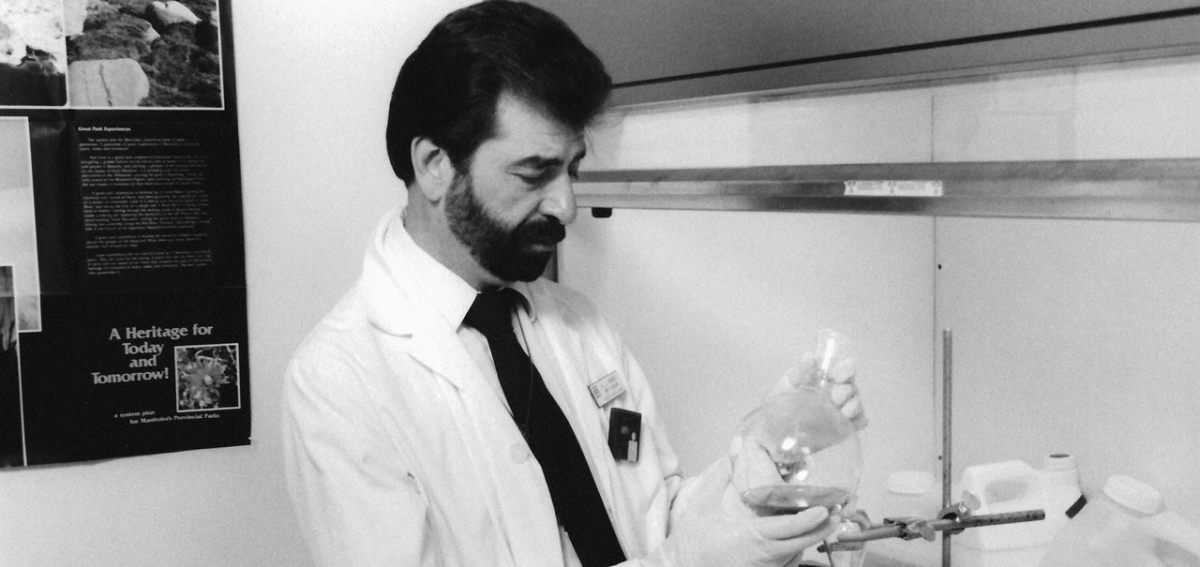
According to Forbes, a pharmaceutical company can expect to spend $350 million on a new drug before it is even for sale.
Add to this the fact that up to 95 per cent of experimental medicines studied each year fail to be both safe and effective in human trials, and it underscores the monumental effort it takes to successfully launch a new drug.
University of Windsor graduate Dr. Lorne Brandes BSc ’64 knows firsthand this challenge. In 1999, the pharmaceutical company that had funded the breast cancer trial for an anticancer drug he’d discovered stopped it cold because of what it perceived as ineffectiveness.
Brandes’ new book, Survival: A Medical Memoir (From Drug Discovery To Clinical Cancer Trials), tells the story of his 23-year odyssey to see his discovery put into the hands of those he hoped to help.
Now retired, he has chronicled the development of the novel antihistamine drug, DPPE, which helped chemotherapy drugs cure laboratory mice of cancer while protecting the bone marrow.
Brandes’ book is more than a scientific recounting. It is a unique and very personal story, full of twists and turns, with an international cast of characters in the world of cancer research, medical oncology, the pharmaceutical industry, and regulatory agencies (Health Canada and the FDA).
Dr. Agnes Klein, Health Canada’s director of the Centre for Evaluation of Radiopharmaceuticals and Biotherapeutics, was actively involved in approving DPPE for the first human trials. In the book’s foreword, she wrote, “To say that I saw (Brandes), from the start, as a ‘unique character’ is an understatement. He was passionate and persistent about his findings on DPPE, his basic and clinical research, as well as his practice of oncology.”
She calls the book a reminder to “researchers, physicians, other health care professionals, and even a regulator like me, that the road to a successful drug is paved with pitfalls, despite all good intentions, and that, while many active substances never ‘make it’, much new knowledge can be acquired along the way.”
“I researched the drug and then took it through the regulatory hoops and into early human clinical trials during a span of 12 years,” Dr. Lorne Brandes
A 2012 article in Nature Reviews Drug Discovery says the number of drugs invented per billion dollars of R&D invested has been cut in half every nine years for half a century. Brandes’ book has touched off the discussion once again. Some of the findings reported in it were, at the time, widely covered in the press, including the Winnipeg Free Press, The Globe and Mail, CBC, CTV, Macleans, U.S. News and World Report, The Wall Street Journal and CNN.
Brandes, MD, FRCPC was a professor of medicine at the University of Manitoba when he sought to take DPPE from the laboratory into human testing.
“I researched the drug and then took it through the regulatory hoops and into early human clinical trials during a span of 12 years,” says the alumnus. He started in 1984 and handed it over to Bristol- Myers Squibb in 1996. The pharmaceutical company declined to invest any further, however, after it decided that preliminary results of a major breast cancer trial didn’t warrant it.
Brandes’ disappointment turned to elation 18 months later, when the stunning discovery was made that women who had received DPPE plus chemotherapy survived 50 per cent longer than women who received chemotherapy alone.
“I and everyone else were dumbfounded. It was totally unexpected.” Brandes says. “While it is not uncommon for drugs to be pulled if the expectations of drug companies are not met, many people felt that, in the case of DPPE, Bristol-Myers had acted prematurely,” he adds.
A year later, a small Canadian biotech company, YM BioSciences Inc. of Mississauga, rescued the drug. With a combination of luck, venture capital and the FDA’s blessing, it took DPPE back into a final trial needed for its approval.
One of the book’s key messages is that a single investigator at a single institution taking a drug from the laboratory bench into human clinical trials without support from a drug company or clinical trials group was both unique and a product of 1990s culture.
Says Brandes: “I do not believe it could happen in 2016 because the ever-increasing layers of institutional bureaucracy and risk-averse lawyers that permeate modern-day society would likely prevent any similar discovery from getting off the ground.
“It’s a sad reality.”
Survival: A Medical Memoir (From Drug Discovery To Clinical Cancer Trials) is available in the Campus Bookstore, or may be ordered from FriesenPress, Chapters/Indigo, Amazon, Kobo and iTunes.